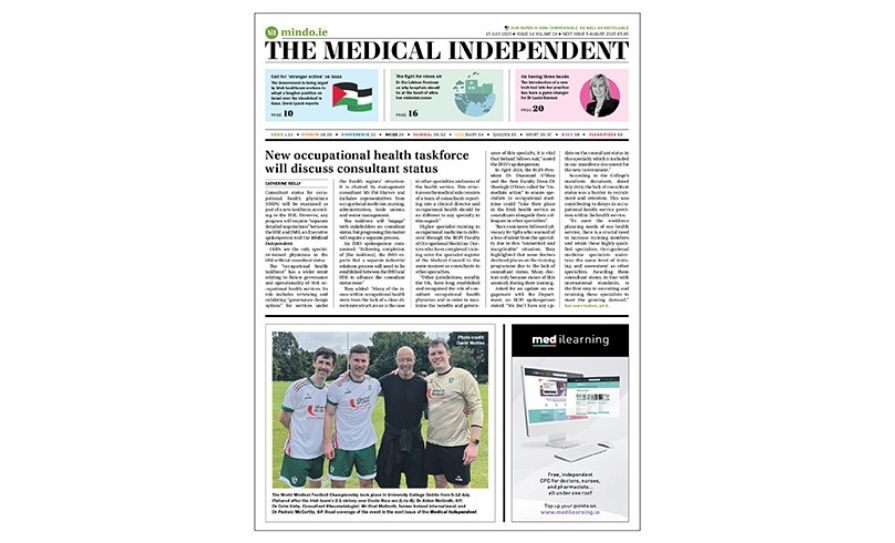Over six months since talks on a new consultant contract began, the process has stalled and frustration among doctors is mounting. David Lynch reports
In October last year, Minister for Health Stephen Donnelly told the online IHCA annual conference that he would like to see a new Sláintecare, ‘public-only’ consultant contract agreed “within weeks”.
Much of the online reaction to the Minister’s comments from consultants and other doctors described his timeline as optimistic.
And so it has proven. Six months on, and the talks are described as ‘stalled’, with no Chair and no clear date for when they are to finish (see panel below).
Senior Counsel Ms Marguerite Bolger was appointed Chair of the negotiations last year, but has since been appointed as a High Court judge. Since December there has been little movement in the talks.
As reported by this newspaper earlier this month, the HSE National Director of Human Resources, Ms Anne Marie Hoey, told a HSE people and culture committee meeting in December that the talks were taking “longer than expected”.

In recent weeks, consultants have become more vocal with their concerns about lack of progress. At the end of last month, IHCA President Prof Alan Irvine said the “record number” of vacant consultant posts needed to be filled and this required Government to “reverse the flawed decision to cut the pay of consultants appointed after 2012 and end the pay disparity immediately”.
“It also must appoint a new independent Chair, agreed with the representative organisations, to oversee the new consultant contract negotiations, which have [been] stalled by the State with no engagement since last December.”
Writing in the pages of the Medical Independent (MI) last month the Association’s Vice-President Dr Gabrielle Colleran described the talks as “stalled since mid-December 2021” and that the “Government decision to exclude consultants from the final round of FEMPI reversals has served only to damage relations further at a critical juncture for the health service”.
Dr Clive Kilgallen, Chair of IMO consultant committee confirmed to MI that “we haven’t had a negotiating meeting since Christmas”.
“The Chair left to take up another appointment. But the HSE and the Department of Health have not appointed a new Chair and that’s surprising, considering the crisis in the medical workforce and the number of consultant vacancies.”
Dr Kilgallen, who is part of the IMO negotiation team, said it is “absolutely critical that there is a contract and that it gets out and that it’s agreed”.
Citing the 2012 decision to introduce a 30 per cent pay cut for newly appointed hospital consultants, Dr Kilgallen said such “unilateral” moves are “clearly disastrous”.
“If a contract was rolled out without agreement, it’s not going to work. It’s going to create way more problems. So we need an agreed and discussed contract. We are very clear in the IMO that we are ready to sit down.
“We are ready to hammer out a deal; we are able to do what it takes. We are here to work for our members, but equally we are here to create an efficient and effective healthcare system.”
Dr Kilgallen said he believed Minister Donnelly is “keen to move things forward, and we are keen to move things forward”.
When asked its appraisal of progress to date, a Department of Health spokesperson told MI that the Government “remains committed to introducing the Sláintecare consultant contract in our health service as soon as possible”.
“The Department with the HSE has been engaged with the representative bodies on the contract. The previous Chair of the talks was appointed to the High Court.
Coming a decade into a consultant recruitment crisis, the new consultant contract is critical for the future medicalworkforce and for the success of Sláintecare
Timeline of a ‘stalled’ process
December 2020: A Department of Health spokesperson tells the Medical Independent (MI) that a new ‘public-only’ Sláintecare contract for consultants remained a “priority”.
May 2021: Proposed draft contract is brought forward by the Department. Its contents spark significant criticism from consultants and NCHDs online and from both the IMO and IHCA.
September 2021: Negotiations on a new contract begin between the Department and the HSE with the IMO and IHCA. The process is chaired by Ms Marguerite Bolger SC.
October 2021: Minister for Health Stephen Donnelly tells the IHCA annual conference that he wants to see a new contract agreed “within weeks”.
December 2021: Ms Bolger is appointed to the High Court and is no longer Chair of the negotiations. According to the IHCA, the last engagement on the contract took place this month.
March 2022: IHCA President Prof Alan Irvine calls for a new Chair for the negotiations to be appointed and a re-start to the process, which has been “stalled by the State with no engagement since last December”.
April 2022: Almost a year since the draft contract was released, the Department tells MI the appointment of a replacement Chair for the talks and resumption of engagement “are currently being given consideration by Government”.
“The appointment of a replacement for the previous Chair and resumption of engagement are currently being given consideration by Government. Given the current position it would not be appropriate to comment on the details of engagement to date.”
However, speaking at the Oireachtas joint committee on health on 6 April, Mr Robert Watt, Secretary General, Department of Health said that “we haven’t given any commitment on a new Chair”. Under questioning from Fine Gael Deputy Colm Burke, Mr Watt added: “What we would like is the talks to recommence… a chair may not be appointed.”

Critical
This may be a time of little movement, but all sides expect the talks to eventually restart in the coming period. So how important is a successfully negotiated contract to encouraging more doctors to remain in the country?
“Coming a decade into a consultant recruitment crisis, the new consultant contract is critical for the future medical workforce and for the success of Sláintecare,” Dr Niamh Humphries (PhD), Senior Lecturer at the RCSI Graduate School of Healthcare Management, told MI.
Dr Humphries was previously part of the RCPI hospital doctor retention and motivation (HDRM) team, which carried out extensive research on Irish doctors’ motivations to leave Ireland, or to stay and work in the country.
“If the Irish health system wants to retain doctors and encourage doctors to return from abroad to take up consultant posts in the Irish health system, it, like any employer, must offer terms and conditions that appeal to potential applicants,” she added.
In May 2021 a ‘draft’ Sláintecare contract from the Department was made public and generated significant criticism from doctors online and from the representative bodies. This was also reflected in the HDRM work.
“When initial details of the contract emerged last year,” said Dr Humphries, “a key concern raised by HDRM respondents was that the new consultant contracts would mean that the geographic mobility, uncertainty, and long working hours associated with being an NCHD would continue into consultancy.
“Having endured several years of high mobility and long working hours during their postgraduate medical training, respondents wanted stability as a consultant and were fearful that the new contract would not provide that.”
Beyond concerns over working hours and mobility, doctors “were also concerned that signing the contract would mean that they could not advocate on behalf of their patients”.
“These and other concerns raised by potential applicants should be addressed during the negotiation process.”

Taking a wider view, Dr Humphries noted that “it is important to remember that Ireland does not have a shortage of doctors, but rather a shortage of doctors willing to work for the terms and conditions on offer in the Irish health system”.
“The new contract should form part of the Irish health system’s attempt to address this in order to improve doctor recruitment and retention and strengthen the medical workforce.”
Dr Kilgallen said the contract is one of a number of tasks that need to be completed to improve the health service and tackle recruitment and retention.
“We’re in a healthcare system right now where there are about a million people on waiting lists,” he told MI.
“People make this very complicated. But, in fact, it is very simple. At some point you’ve a patient who needs to meet a doctor, and when that patient is sick, they need a bed. Patient numbers are increasing, demand is higher.
“From the doctoring point of view, we have an extreme shortfall. So for consultants we are the lowest in the EU [as a proportion of population]… there is a shortage of doctors and a huge shortage of beds…. Simply put, we have lots of patients, too few doctors and not enough beds.”
On the current state of recruitment, Dr Kilgallen said “it’s very hard to get people in”.
“You can see that with the New Children’s Hospital where they haven’t been able to fill positions. For some consultant interviews there is nobody applying… on a good day you might have one person applying… this is completely new in the last number of years.
“One of the huge problems is the 30 per cent pay cut for the ‘new entrants’ from 2012, that hasn’t been addressed, and then the working conditions that we work in are extremely poor compared to other jurisdictions that we benchmark ourselves against.”
Seeking approval
The consultant applications advisory committee (CAAC) ratified its new annual report at its meeting on 8 March.
According to the report, “there was almost a threefold increase (414 in 2021; 155 in 2020) in the number of new posts being applied for compared to 2020.”
The report also noted “there was a noticeable increase in the number of posts recommended for approval at CAAC with an overall increase of 269 consultant posts recommended for approval (547 in 2021, 278 in 2020) approximately a 90 per cent increase”.
Overall, by the end of last year, there were 3,847 approved consultant posts. This is an increase of approximately 11.5 per cent when compared to 31 December 2020, when there were 3,453 approved consultant posts.
A HSE spokesperson told the Medical Independent (MI) that the “increase [in] number of consultant posts applied for in 2021 was in line with the HSE planned investment in additional staffing including additional consultants as outlined in the 2021 national service plan”.
However, in relation to the CAAC figures, a spokesperson for the IHCA said there are 837 consultant posts “that have already been approved, but remain vacant or filled on a temporary, locum or agency basis”.
“This is more than a fifth of all permanent consultant posts,” the Association spokesperson told MI.
“Simply approving additional consultant posts will not address the staffing crisis that continues to impact the delivery of specialist medical and surgical services and the quality of patient care provided – unless these posts can be filled.”
According to the IHCA spokesperson, no consultant appointments were made in 23 out of 100 completed competitions run by the Public Appointments Service (PAS) in 2021. There were no applicants for nine consultant posts advertised.
“The root causes of the shortage in consultant numbers must be tackled to address this crisis in the recruitment and retention of medical and surgical specialists,” continued the spokesperson. “Ensuring that the terms and conditions attached to these posts are attractive to our highly trained specialists, both at home and abroad, is key if these posts are actually to be filled.
“It is essential that the pay inequity imposed by the Government on consultants contracted since 2012 is ended without delay to restore trust and competitiveness so our hospitals can recruit the calibre and number of consultants needed to provide timely care to patients.
“The discrimination against new consultants is the cause of the high level of emigration among newly qualified specialists. The Government must also urgently appoint a new independent chair, agreed with the representative organisations, to oversee the new consultant contract negotiations, which have stalled with no engagement since last December.”
In terms of what can be done, Dr Kilgallen said “a big thing to do would be to reverse the pay discrepancy [the 2012 cut for new entrants], that’s the first thing…. We’ve to change the culture we work in. Make it easier to get things done, easier to get diagnostics, improve multidisciplinary teams… have the system support you to see your patients, rather than every step of the way you are blocked and it’s difficult. And we need more beds.
“In all of this the Government are rolling out Sláintecare and with that, they want a new consultant contract. And there are a lot of issues that doctors and trainees want improved, such as work/life balance. There are a lot of issues that a new contract could help to make the job attractive.”
Numbers
While last year did see an increase in the number of consultant posts recommended for approval (see panel above), both the IHCA and the IMO raise serious concerns over the large number of consultant posts unfilled.
Recently published minutes show that issues around consultant numbers have also featured in HSE meetings this year.
According to minutes from the HSE safety and quality committee meeting in February, members were informed that “while the number of consultant posts has increased over the last 10 years, the proportion of consultants as compared to trainee and non-training NCHDs has decreased”.
In a “high-level presentation” from HSE National Doctors Training and Planning (NDTP), committee members were also informed that in 2011 consultants represented 35 per cent of the medical workforce, while now it is 32 per cent.
“In the last 10 years, there has been a 70 per cent increase in the number of non-training NCHD posts,” according to the minutes. “The consultant application approvals committee (CAAC) approved 550 new posts in 2021, but there was approximately 284 training exits in 2021, so it will prove difficult to fill all approved posts.”
The committee also noted that Ireland has “the highest amount of NCHDs per 100,000 population, when compared internationally”.
Dr Brian Kinirons, Medical Director at NDTP, advised the committee that “there is a need to increase consultants and training doctors, noting that completion of a training programme takes a number of years, and that this will need to be managed in a controlled and incremental way”.
“There are various initiatives being investigated with incentives for recruitment and retention to be considered.”
Over 100 HSE consultants not on specialist registrar
There has been a small increase in the number of consultants employed by the HSE who are not on the Medical Council’s specialist register since last October, according to figures provided to this newspaper.
As of 1 March, there were 108 consultants employed by the HSE who were not on the specialist register, an increase from 105 in October.
According to the figures provided by the HSE, South/South West Hospital Group had the most number of such consultants with 24; Saolta University Health Care Group was next with 20. Dublin Midlands Hospital Group and Ireland East Hospital Group each had 11.
“The data was extracted from DIME (doctors integrated management e-system) as of 1 March 2022,” said a HSE spokesperson.
“DIME is dependent on clinical sites inputting details on their consultant workforce and therefore there may be variances and gaps in the data supplied to that held within clinical sites.”
The issue is included on the HSE corporate risk register (CRR) approved by the HSE in October.
‘Workforce and recruitment’ is one of the 17 red risks (out of a total of 27 risks) and “consultants not on the specialist division” of the register is included in the longer description of this risk.













Leave a Reply
You must be logged in to post a comment.